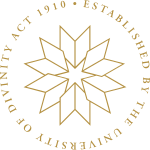University of Divinity
Collegiate university in Australia From Wikipedia, the free encyclopedia
Collegiate university in Australia From Wikipedia, the free encyclopedia
The University of Divinity is an Australian collegiate university with a specialised focus in divinity and associated disciplines. It is constituted by twelve theological colleges from seven denominations and three schools. The University of Divinity is the direct successor of the second oldest degree-granting authority in the State of Victoria, the Melbourne College of Divinity. The university's chancery and administration are located in Box Hill, a suburb of Melbourne in the state of Victoria.
 | |
Former name |
|
|---|---|
| Type | Collegiate theological university[2] |
| Established | 1910[3] |
| Accreditation | TEQSA |
Religious affiliation | Christian denominations |
| Chancellor | Graeme Blackman |
| Vice-Chancellor | James McLaren |
| Location | , |
| Campus | National collegiate with multiple sites[5] |
| Colours | Red Gold |
| Website | divinity.edu.au |
 | |
The Melbourne College of Divinity was constituted in 1910 by an act of the Parliament of Victoria. The act was amended in 1956, 1972, 1979, 1990, 2005 and 2016 and is now known as the University of Divinity Act 1910 (previously the Melbourne College of Divinity Act 1910).[6][7] From its beginnings the college was a self-accrediting issuer of degrees, while not becoming a university until 2011. Representatives appointed by several churches formed the college to provide tertiary level theological education. The first president was the Right Reverend Henry Lowther Clarke, Anglican Archbishop of Melbourne, and the first registrar was the Reverend John Mathew, Moderator of the Presbyterian Church of Victoria.[8]
In 2010, the Melbourne College of Divinity applied to the Victorian Regulation and Qualifications Authority for approval to operate as a self-accrediting "Australian University of Specialisation"[9] (a category of higher education provider[10]). The Victorian government announced on 30 August 2011 that the application had been approved and on 1 January 2012 the college began operating as a university. Peter Sherlock was appointed the inaugural vice-chancellor in April 2012.[9] In May 2019 TEQSA extended the seven-year licence to operate as a university for an additional three years to the maximum possible of ten years before a review. On 1 July 2021, TEQSA changed the provider category of University of Divinity from Australian University of Specialisation to Australian University, with self-accrediting authority in the broad field of Society and Culture’.[11]
In the 2022 Student Experience Survey, the University of Divinity recorded the highest student satisfaction rating out of every Australian university, with an overall satisfaction rating of 91.[12]
The University of Divinity offers awards in theology, philosophy, counselling, ministry, leadership and professional supervision.
In 2001 the institution was listed as a Schedule 1 Higher Education Institution by the Australian Government Department of Education, Science and Training. It receives federal funding for research, Australian Postgraduate Research Awards and International Postgraduate Research Scholarships.
The Higher Education Support Act (2003) (HESA 2003) listed the institution as a Table B (Private, Self-regulating) Higher Education Provider, which allowed its students to access federally funded loans under the FEE-HELP scheme.[13]
The colleges of the University of Divinity are:[14]
The three schools associated with the University are: the School of Indigenous Studies, the School of Graduate Research, and the School of Professional Practice.[19][20][21]
Students at the university have access and borrowing rights to a number of library collections including the Mannix Library at Catholic Theological College, Geoffrey Blackburn Library at Whitley College, the Leeper and Mollison Libraries at Trinity College Theological School, as well as the Dalton McCaughey Library, the Patrick Murphy Memorial Library, the Redemptorist Seminary Library, the Dominican Studium Library, the St Pashcal Library and the Sugden Collection at Queen's College.
Seamless Wikipedia browsing. On steroids.
Every time you click a link to Wikipedia, Wiktionary or Wikiquote in your browser's search results, it will show the modern Wikiwand interface.
Wikiwand extension is a five stars, simple, with minimum permission required to keep your browsing private, safe and transparent.